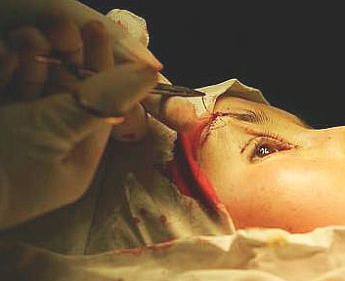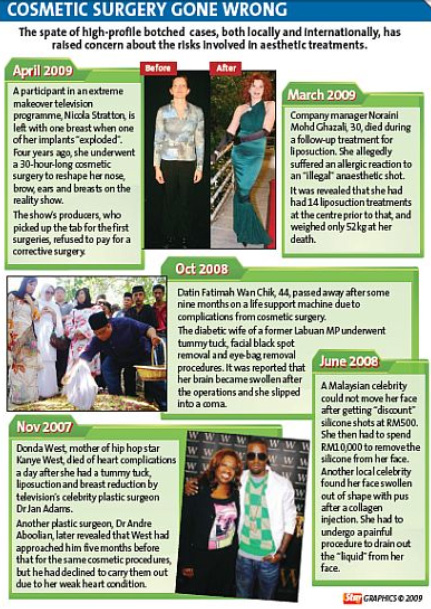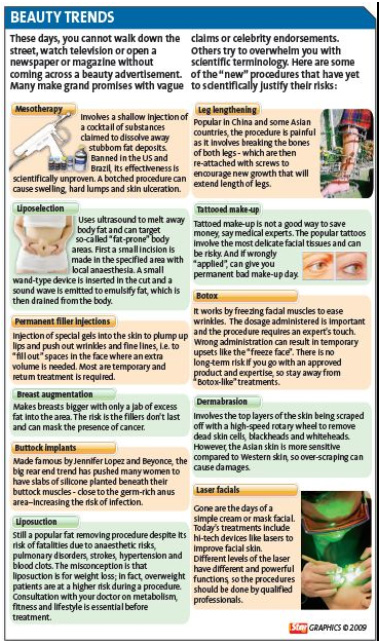|
The ugly side of beauty
By HARIATI AZIZAN

The soaring demand for cosmetic
surgery has made it a big business. Without proper regulations,
however, the risks are equally big.
SHE tried to do everything by the book.
Melissa (not her real name), 25, equipped herself with necessary
information on the fat removal surgery she wanted to do through
Internet research and telephone queries. To be extra safe, she even
consulted a verified specialist who has a registered clinic.
But when the doctor – yet another one –
refused to give the 52kg, 160m tall public relations manager her ideal
physique, Melissa decided to turn to one of the more accommodating
beauty salons to make her dream of becoming beautiful come true. She
was lucky to come out of the surgery alive.
As it turned out, the centre’s trained,
foreign “specialist” was a fraud, and the heart complication she got
from the procedure was nearly fatal.
Cases like this are common, warns the
Malaysian Association of Plastic, Aesthetic and Craniomaxillofacial
Surgeons (Mapacs).
Its former president Dr V.
Surendranathan says more and more people, especially young women, are
falling prey to such unscrupulous beauty centres which feed on their
insecurities and desires.
 |
Unlike a responsible doctor
who will conduct thorough examination on the patient
before deciding on the best treatment option, beauty centres
will bend backwards to follow the customers’ wishes, regardless
of the medical risks. – AP |
He says it is becoming an obsession in
today’s society to look beautiful, and many will not think twice about
spending thousands of dollars or going under the knife for
enhancements.
“This obsession makes them susceptible
to unscruplous cosmetic practitioners. For example, if you are in your
20s and weigh around 50kg, you don’t need to go for surgery like
liposuction to be slimmer. The healthiest way is to exercise more and
switch to a healthier diet.
“But many are too impatient; they call
one of the beauty centres which advertise in newspapers and magazines
and ask them for surgery.
“How many do you think will take their
money and do it without question?” he asks.He cites the recent case of
the 30-year-old company manager who died during a follow-up treatment
for her 15th liposuction in Ampang, as an example.
“She had 14 liposuctions before that
fatal one and weighed less than 53kg. You don’t have to be a medical
expert to see that she may not have had much extra fat to be sucked
out. An ethical doctor would have advised her against the procedure
and see if she needs any psychological help (with body image issues),”
says Dr Surendranathan.
He adds that a responsible doctor will
conduct a thorough examination of the patient’s physical condition and
medical history before deciding on the best treatment for him or her.
“It’s different with beauty centres.
They will bend backwards to follow the customers’ wishes, regardless
of the medical risks. Some even promise miracle transformations,” he
opines.
Society for Anti-aging, Aesthetic and
Regenerative Medicine Malaysia (Saaarmm) secretary Dr Anandan
Subramaniam agrees.
“Some patients want to save time and
money and request for a few different cosmetic surgeries in one go,
like a nose job plus a tummy tuck and facelift. That will be risky,
because of the anaesthetic – you cannot go under too long as it might
cause complications.
“But for those motivated only by money,
they will have no reservations about conducting the procedures on
patients,” he says, citing the case of the wife of a former Labuan
politician who slipped into coma and died after having a few nip and
tuck procedures in Klang as example.
“Although the cause of her death has
not been concluded, on the outset, it is clear that the combination
and number of procedures she underwent were not advisable,” he says.
Undeniably, the beauty and wellness
industry is very lucrative. According to the Malaysian Medical
Council, the billion-dollar industry is growing by 15% annually.
“It is a parallel industry worth 10
times more than what the medical industry is worth, paying taxes that
are probably double or triple what doctors pay. It employs many
people, so it has a lot of clout,” says Dr Surendranathan.
The potential for huge profits,
however, has spurred the growth of back-street practitioners with
little experience or expertise in handling the surgeon’s scalpel or
even other non-surgical cosmetic equipments.Worse, notes Dr
Surendranathan, it has lured not only “quack doctors” but also general
practitioners who are untrained in the field but want to make a quick
buck. Mapacs estimates that at least 80 cosmetic
surgeries go wrong a month.
“We have not done a proper research but
what we know is that if you conduct a survey among plastic surgeons in
the country on how many botched surgery cases they get a month, they
will say one to two.
“There are about 40 plastic surgeons in
the country, which makes it some 80 botched surgeries a month and 960
cases a year,” says Dr Surendranathan.
Mapacs president Dr Peter Wong concurs.
“These are patients who are prepared to
come to us after a botched surgery and spend more money on corrective
procedures. Who knows how many more are suffering in silence?” he
asks.
Dr Wong points out that the number of
advertisements in the media gives a very strong indication of the
number of illegal practitioners who are out there.
“Last year, the Health Minister himself
said that there are only 1,800 specialists in the country, out of
which fewer than 200 are plastic surgeons and dermatologists.
“But we have up to 140,000
establishments in the beauty field. The question is, how many employ
qualified medical personnel?” he asks.
In 2007, the Health Ministry drew up a
guideline on the dos and don’ts of cosmetic surgery.Under the
guidelines, non-medical specialists, including private general
practitioners, are not allowed to carry out procedures such as breast
implants, liposuction, eyelid surgery, laser and light-based therapies
and hair transplant.

They are also prohibited from dealing
with unapproved agents and inject non-evidence based products like
Vitamin C, placental extract or stem cells.
Regulations crucial
Malaysian Association of Standard Users
chief executive officer Ratna Devi Nadarajan, however, firmly believes
that stronger laws are needed.
“Currently, there are no laws to govern
beauty parlours or spas and centres offering cosmetic surgery. Without
a law to at least require them to register cosmetic surgery
operations, it will be difficult for the authorities to monitor them.
Even medical practitioners like doctors need to register.
“According to the Health Ministry,
there are about 8,000 to 10,000 beauty centres operating illegally.
You know the figure, so why is nothing being done to regulate them?”
she asks.
Ratna stresses that it is time to enact
the much-talked-about Cosmetology Bill.
“The last two incidents should have set
the platform to hasten the Bill. The ministry has been talking about
it since 2006 but nothing has come out of it. It keeps postponing it.
Every time someone dies from an illegal cosmetic surgery, it is
brought up but until now it has not been legislated.”
Malaysian Beauty Therapy Association –CIDESCO
Section Malaysia President Datin Dr Clara L. Chee agrees that
regulations are urgent.
“The Government should enforce clear
guidelines that differentiate medicinal from cosmetic treatments. The
control on the cosmetic industry is for the safety of the public.
“It is not the customers’ fault, it is
the fault of the people in the industry who over-promise and
compromise a lot to make profit. But with stringent laws, we can avoid
botched jobs and unwanted incidents.”
She adds it will help create a more
positive image of the cosmetology practice in Malaysia.
“The beauty industry is being tarnished
by these illegal practitioners. Contrary to popular belief,
beauticians also have ethics in their profession. Those who want to
enter the aesthetic field need to undergo training. We also want to
maintain high standards in our field and not cross the boundary,” she
says.
When contacted, Health Ministry
director-general Tan Sri Dr Ismail Merican assures that the Bill will
be enacted soon.
“It is taking a while as there are many
issues to settle. The coverage is just too wide. But the present
guidelines as stated are still applicable. The cosmetologists must
know their limitations and the public must be cautious. They should
now know what can be done and what cannot be done by non-doctors.”
Adds Dr Ismail, once the Cosmetology
Bill is legislated, unsafe practices will be regulated and controlled,
besides ensuring patient safety and quality of care provided.
“The objective of the Bill is to ensure
cosmetologists do not cross the line between cosmetology and medical
practices,” he notes.
Dr Surendranathan, however, stresses
that a new law would only be effective with strong enforcement.
“The law needs to be clear about the
do’s and don’ts, so a Cosmetology Act will help but without
enforcement, it will mean nothing.”
He highlights, for example, that under
existing laws, illegal cosmetic “surgeons” have to be caught in the
act before they can be charged.
“What are the chances of that
happening? More often than not, they will get information that
enforcement officers are coming and they can run.
“Patients, meanwhile, will be pushed
out the back door so they get terrified and run away. They wouldn’t
wait to talk to the enforcement officers and help in the
investigation,” he says.
Until the proposed Cosmetology Bill is
enacted, self-protection is the best protection for consumers.
“It is the Government’s responsibility
to regulate the industry and protect consumers with the necessary
laws. Without such laws, consumers have no other choice but to protect
themselves. A main problem, however, is the lack of information
available,” he adds.
Chee concurs and advises those who
decide to undergo any cosmetic surgery to consult a doctor,
“A thorough research is important
before one undergoes any cosmetic procedure. And when you do get a
treatment from a doctor, ensure that the doctor is qualified.
“The simplest way is to look for the
qualifications on the wall. Same thing with the beauticians at the
beauty saloon – you can look out for the certificates.”
She says those concerned can contact
CIDESCO Section Malaysia to ensure that the beauticians they are
getting consultation or treatment from are verified. The association
has a registry of beauticians which customers can check to verify that
they are trained.

Need for caution
It is best for the public to exercise
some caution before committing themselves to any form of cosmetic
treatment or surgery, echoes Dr Wong.
“They should find out more about the
treatments that they intend to undergo, and make sure that they
actually require the procedure.
“It is very important that one should
actually consult a bona fide doctor who is appropriate for the
particular cosmetic treatments sought.
“One always has to make sure that
he/she gets to consult with the doctor or specialist who is actually
going to do the treatment procedure and not some ‘cosmetic advisor’
who acts as the middleman. Consultation, clinical examination,
rationale for the choice of the procedure, the pros and cons, type of
anaesthesia, place of surgery, backup supports and the after-care are
all relevant and important considerations,” he stresses.
Dr Anandan warns that sometimes, things
can still go wrong even if trained doctors conduct the procedures.
“That is why it is important for you to
check what emergency support system the doctor has in the clinic.”
More importantly, says Chee, a person
must first analyse their needs honestly before going under the knife.
“They need to ask themselves if they
really need to have surgery or just get a healthier lifestyle,” she
says
Ultimately, opines Dr Anandan, the
final say on whether to perform the surgery or not is in the hands of
the practitioner.
“If a patient goes down on her knees
and begs for cosmetic surgery, my duty is to look at the safety aspect
– whether it will bring side effects or harm her.
“I cannot just fulfil the patient’s
wishes without looking at all aspects of the problem and weighing the
advantages and risks. I have to be careful not only about the physical
aspects but also the psychological effects,” he says. |

